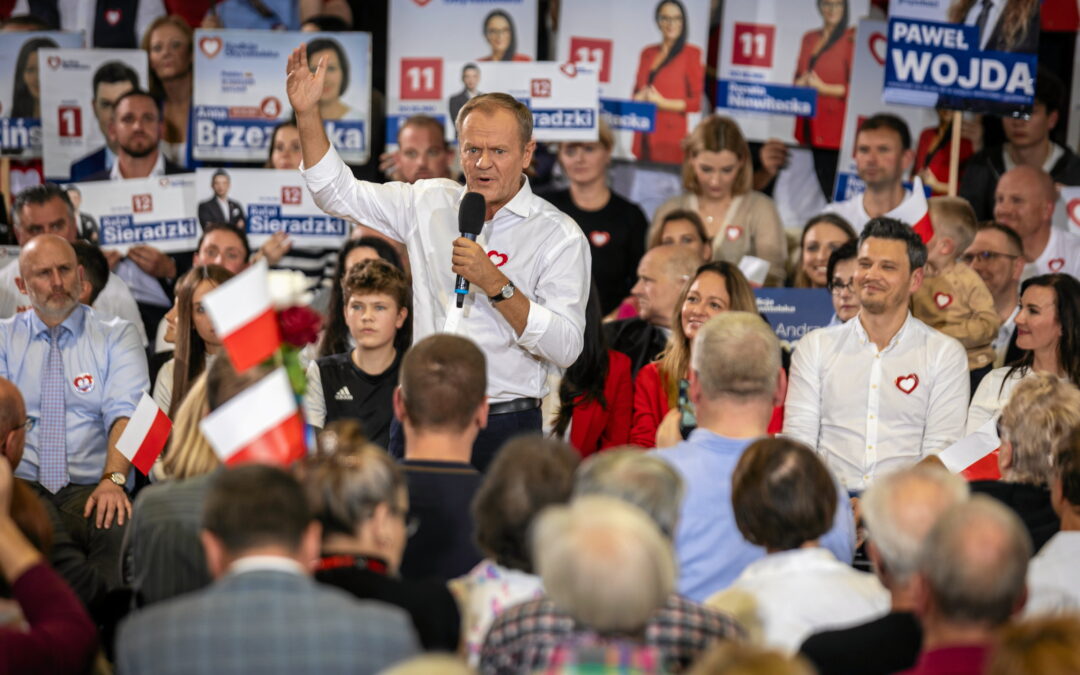By Daniel Tilles
Exit polls from yesterday’s parliamentary elections in Poland suggest that, although the ruling national-conservative Law and Justice (PiS) party won the largest share of the vote, it lacks the parliamentary majority to remain in power.
Instead, an opposition coalition made up of the centrist Civic Coalition (KO), centre-right Third Way (Trzecia Droga), and The Left (Lewica) look likely to have won enough seats to form a new government.
The #exitpoll from Poland's elections indicates that, although the ruling party came first, it has lost its parliamentary majority and that an opposition coalition could form a government.
See our full report by clicking here ⬇️ https://t.co/zxk5axl6No
— Notes from Poland 🇵🇱 (@notesfrompoland) October 15, 2023
While we still need to wait for the final results to be confirmed – which should happen today or tomorrow – all political groups have accepted that the exit polls are more or less accurate. What conclusions can we draw from them?
Tusk remains a formidable force
In the wake of last night’s exit poll results, a columnist for Rzeczpospolita, a leading daily, declared that opposition leader Donald Tusk had “become the king of Europe” by successfully returning to domestic politics and ousting the PiS government.
There was more than a hint of hyperbole in bestowing that title. Yet it is certainly true that the opposition’s victory is both significant at a European level and is above all Tusk’s success. He now seems set to return as prime minister, a position he previously held from 2007-14.
"Donald Tusk has become the king of Europe," declares a columnist for leading daily @rzeczpospolita.
His "return to power will give him enormous authority in Brussels" and "Poland may become one of the three most important countries in the EU, alongside Germany and France". pic.twitter.com/HpSttjjmLV
— Daniel Tilles (@danieltilles1) October 15, 2023
Despite already being a pensioner, the 66-year-old Tusk has campaigned energetically, both at rally events around the country but also as an adept user of social media.
His presence also helped to bring out the worst in his old rival, Jarosław Kaczyński, chairman of the ruling Law and Justice (PiS) party.
PiS’s campaign, especially in the final months, focused overwhelmingly on attacking Tusk, an approach that may have fired up the party’s base but did little to appeal to those beyond it. Tusk, moreover, revelled in this rivalry, knowing precisely which buttons to press to anger Kaczyński.
Donald Tusk is “the personification of pure evil” and opposition “traitors must be morally exterminated", says ruling party leader Jarosław Kaczyński.
The only way to stop Tusk "implementing Brussels' plan" in Poland is to vote for PiS, he warned https://t.co/CT5ThYWxdv
— Notes from Poland 🇵🇱 (@notesfrompoland) August 14, 2023
Opposition strength in diversity
After returning to lead his old Civic Platform (PO) party in mid-2021, Tusk spent most of the next 18 months trying – as previous PO leaders had done – to unite the mainstream opposition into a single, united anti-PiS coalition.
That never seemed like a good idea. First of all, there was little appetite from other opposition parties to be swallowed up by PO.
Second, as PO’s experience in previous elections should have made clear, being anti-PiS is not enough to win elections. And it would be hard for such a broad coalition – ranging from left to centre-right – to agree on any shared platform beyond opposing the government.
A new poll has reignited calls for the opposition – from left to centre right – to unite to oust Poland's ruling party.
But the idea is more problematic than proponents such as @donaldtusk suggest and a joint list remains unlikely, writes @danieltilles1 https://t.co/JiKSLdt2pz
— Notes from Poland 🇵🇱 (@notesfrompoland) May 18, 2022
Eventually, by early this year, Tusk had abandoned the idea. Instead, the opposition coalesced into three main blocs: the centrist KO, dominated by Tusk’s PO party; The Left; and Third Way, a centre-right coalition of the Polish People’s Party (PSL) and Poland 2050 (Polska 2050).
As I argued last year, this was an optimal configuration for the opposition: it provided voters with a genuine choice – something impossible to do with a single opposition list – while also ensuring that each group was large enough to exceed the electoral threshold to enter parliament (unlike in 2015, when divisions on the left resulted in its two factions both falling below the threshold, thereby helping PiS win power).
Each of the three blocs conducted its own, separate campaign, yet they also largely avoided attacking one another and made clear that they would be willing to form a coalition government with one another after the elections.
In particular, the independent presence of the centre-right Third Way appears to have been a boon for the opposition, offering an option for voters disillusioned with PiS but unwilling to vote for Tusk or the far right.
That, along with a strong performance from one of the coalition’s leaders, Szymon Hołownia, in last week’s televised debate, appears to have helped Third Way achieve an unexpectedly positive result, with 13.5% in the exit poll.
Success of Third Way in Poland's election (approx. 14%): Crucially, they took voters off PiS, far more than any other opposition group. 9% of their voters chose PiS in 2019 – plus 19% "I don't remember", highest of any party (many of them also possibly bashful former PiS voters).
— Stanley Bill (@StanleySBill) October 16, 2023
Policies and positivity win elections
Another lesson that Tusk seems to have learned from repeated PO defeats to PiS in every election since 2015 is that, as well as criticising the government, it is vital to present voters with a positive alternative.
In recent years, it has been hard to know what PO stands for. In 2021, before Tusk’s return, I called them a “zombie party”, lumbering forward without direction but remaining large and strong enough to hold back the rest of the opposition.
Poland's main opposition group, PO, which turns 20 today, has become a "zombie party", lacking leadership and purpose, argues @danieltilles1.
Without major change, PO could undermine opposition to the government and help it win an unprecedented third term https://t.co/NXOfZSh6rb
— Notes from Poland 🇵🇱 (@notesfrompoland) January 24, 2021
That has now changed. Last year, Tusk issued clear positions on the kinds of controversial issues that PO – which encompasses both social liberals and conservatives – had long avoided tackling.
He declared support for abortion on demand (and warned that anyone who did not accept that would not be allowed to stand for the party) as well as for same-sex civil partnerships.
A month before the elections, he outlined 100 policies his government would introduce in its first 100 days in power – a decisive response to those who accused PO of not standing for anything other than being anti-PiS.
Third Way and, in particular, The Left also set out clear policies that they wished to follow upon coming to power.
Poland’s main opposition has unveiled 100 policies for its first 100 days in office if it wins power
They include doubling the tax-free income threshold, making abortion "legal, safe and available", raising public-sector pay and abolishing the Church Fund https://t.co/eXAXUtNfdA
— Notes from Poland 🇵🇱 (@notesfrompoland) September 11, 2023
Meanwhile, KO’s campaign, particularly in its final weeks, shifted towards a more positive tone. Journalist Agata Szczęśniak neatly encapsulated the change by showing two very different KO election posters in exactly the same place, one month apart.
The first, from early September, showed a dark, menacing image of Kaczyński alongside the words “I am the threat”. It contained no clear reference to KO, let alone an appeal to vote for them.
The second, from early October, showed a colourful image of the children of opposition politicians alongside the words “Vote for us” and the large heart logo of KO.
To samo miejsce. Ta sama kampania. Ta sama Koalicja Obywatelska.
4 września 2023.
11 października 2023. pic.twitter.com/vzMGr8XojZ— Agata Szczęśniak (@szczesniak__a) October 11, 2023
An uncertain future for PiS
In the wake of last night’s exit poll results, Prime Minister Mateusz Morawiecki sought to put a brave face on the outcome.
“We won!” he declared, calling it a “historic victory” because PiS had become the first party in Poland to win the most votes in three parliamentary elections in a row.
Such rhetoric, which ignores the reality that PiS has almost certainly lost power, should of course not be taken at face value. But it contains a grain of truth.
For a party that has been in power for eight years – during which time it has faced a pandemic and the fallout from the war in neighbouring Ukraine – to still come first in these elections is impressive. (Equally, of course, it should be noted that PiS exploited its incumbency advantage to use all state levers at its disposal to boost its re-election campaign.)
Despite its seeming defeat, PiS will remain a strong opposition in parliament.
A selection of charts from Poland's election yesterday showing how Poles voted overall – giving the opposition a majority – as well as by age, gender, level of education and place of residence, according to the exit poll https://t.co/ecAdQcsoSJ
— Notes from Poland 🇵🇱 (@notesfrompoland) October 16, 2023
Yet there are reasons to doubt the party’s future. Its structures have been built around one man, Kaczyński, who is now 74 years old and said when re-elected (unopposed, as always) as PiS chairman in 2021 that it would be his last four-year term.
Kaczyński has admittedly talked of retirement before, only to change his mind. It is possible he may once again decide to stay on. But it is hard to image a man who will be aged 78 at the next scheduled elections, and who has suffered health problems in recent years, leading his party into a bright future.
Yet equally, Kaczyński – rather like Tusk with PO – has maintained his grip on the party in part by ensuring there is no obvious candidate to replace him.
Whenever he does leave, it could trigger a bitter struggle within PiS, fragmenting the party, or it could produce the kind of leaders that succeeded Tusk in PO, who left the party without direction for years.
The far right peaked too early
While Third Way achieved a surprisingly high result, the far-right Confederation (Konfederacja) obtained a surprisingly poor one, with an estimated 6.4% support and only 14 seats in parliament. If confirmed in the official results, that would be worse than its showing in 2019.
A few months ago, things looked very different. Confederation had surged to double-digit support in the polls, leading many – including me – to tip it as a potential kingmaker in deciding whether PiS or the opposition would be able to govern.
The far-right Confederation is now running third in the polls with double-digit support.
That raises the likelihood of it holding the balance of power after this year's elections and has led to renewed scrutiny of the views of its young new leader https://t.co/jrC2mmxENi
— Notes from Poland 🇵🇱 (@notesfrompoland) April 2, 2023
However, its support has dipped in recent weeks, and the nationalists may have been a victim of their own early success.
Their rise in the polls was predicated in large part by the emergence of Sławomir Mentzen, a young leader of one of Confederation’s main factions, who shifted the group’s focus away from nationalist rhetoric on issues like Ukrainian refugees and instead focused on economic libertarianism.
That exploited a significant gap in a political market where all other parties had, to a greater or lesser extent, been promising to maintain the PiS government’s generous social handouts and other forms of state support.
Yet as Confederation rose to prominence, it drew more attention to the extremist positions its members, including Mentzen, have expressed in the past on migrants and refugees, abortion, Jews, vaccines and LGBT people. That likely put off many voters.
An old video has emerged showing the campaign chief of the far-right Confederation pledging that his movement will create a register of gay people if it comes to power
The party is currently running third in the polls for October's parliamentary elections https://t.co/ijufFJBjjh
— Notes from Poland 🇵🇱 (@notesfrompoland) September 1, 2023
It also revealed the lack of depth the party has below its capable main leaders, Mentzen and Bosak. And it encouraged other groups, especially the Third Way, to pitch their own free-market ideas to win over some of those who had been tempted to vote for Confederation despite not sharing its nationalist views.
The failure of the more “moderate” approach taken by Mentzen is now likely to have repercussions within Confederation. That may include some of its more controversial and extreme figures who were hidden during the election campaign – such as Grzegorz Braun, a promoter of various conspiracy theories – coming back to the fore.

Notes from Poland is run by a small editorial team and published by an independent, non-profit foundation that is funded through donations from our readers. We cannot do what we do without your support.
Main image credit: Grzegorz Celejewski / Agencja Wyborcza.pl

Daniel Tilles is editor-in-chief of Notes from Poland. He has written on Polish affairs for a wide range of publications, including Foreign Policy, POLITICO Europe, EUobserver and Dziennik Gazeta Prawna.



















